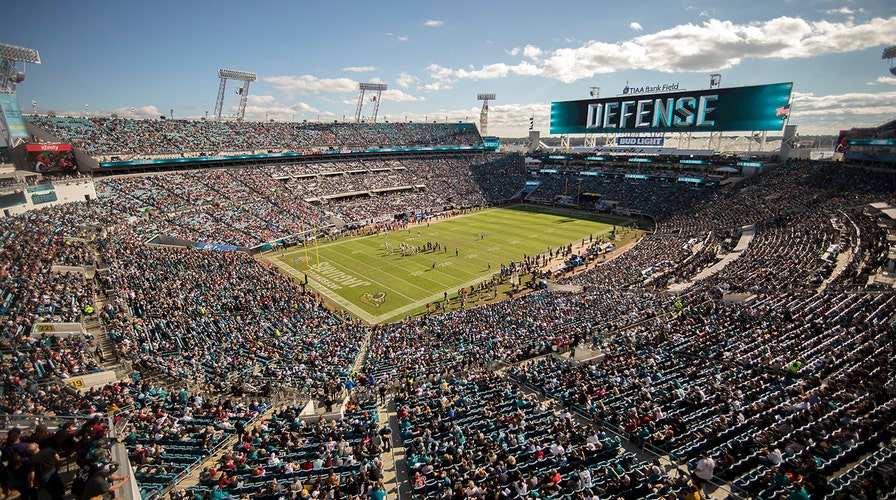Fox News Flash top headlines for August 25
Fox News Flash top headlines are here. Check out what's clicking on Foxnews.com.
The jokes write themselves: The Jacksonville Jaguars are going to play home games in front of a significantly reduced number of fans this season.
“How’s that different than any other year?”
Don’t laugh. The Jaguars — along with Atlanta, Cincinnati, Miami, Tampa Bay and others — might be better equipped to handle the NFL’s drastic change in hometown support. They’ve dealt with it for years.
CLICK HERE FOR MORE SPORTS COVERAGE ON FOXNEWS.COM
Videoboard enhancements? Player-generated content? On-field celebrations recognizing community heroes and military veterans? Some NFL teams have been doing those and more for decades to help offset fewer butts in seats.
“One of the unfortunate advantages of being in a smaller market like Jacksonville is we have to get a little more creative in terms of how we create that home-field advantage,” Jaguars President Mark Lamping said. “We’d have to do that if it’s normal capacity or not.”
Twenty-one of the NFL’s 32 teams have ruled out spectators for the start of the season, with Buffalo, Cincinnati, Los Angeles, Minnesota and San Francisco the latest to announce plans Tuesday. At least eight are preparing to host a limited number of fans.
The bottom line: home-field advantages created by generations of fandom — most notably and noticeable in Green Bay, Kansas City, New Orleans, Philadelphia, Pittsburgh and Seattle — could be momentarily wiped out by the coronavirus pandemic.
Teams are adjusting.
New-age videoboards and top-of-the-line sound systems are taking center stage and assuming the all-important role of helping hype players in home venues. Those extras could spill into living rooms as several teams, including Jacksonville, are launching phone apps designed to provide in-stadium experiences to those watching from couches and comfy chairs.
Want to see player introductions? Want to experience a military flyover just before kickoff? The Jaguars are giving fans at home a peek at both through their new app.
The television product, meanwhile, might not look a whole lot different aside from empty venues or sparse crowds. The NFL’s TV partners are expected to add fan reaction to broadcasts.
For players and fans on hand, the voids will be filled by simulated crowd noise. The NFL is expected to allow 80 decibels piped in, a number many teams are already using during training camp practices and scrimmages.
General managers, coaches and team officials are preparing to play with that simulated crowd noise. Normal conversation is about 60 decibels. Double that for a rock concert. Eighty decibels equate to being in heavy traffic or next to a lawn mower. Anything above 85 is consider dangerous, depending on the duration of the exposure, the number of times exposed and the use of hearing protection.
According to the Guinness Book of World Records, Kansas City’s Arrowhead Stadium holds the record for the loudest NFL game. Chiefs fans registered 142.4 decibels on Sept. 29, 2014, while hosting the New England Patriots on Monday Night Football.
Going from 80,000 die-hards to 80 decibels will sound like relative silence for anyone accustomed to a raucous, three-hour Sunday afternoon.
“I’m a defensive guy, so I need fans,” Philadelphia Eagles cornerback Nickell Robey-Coleman said. “I love my fans. That’s a big edge. People don’t know how much it affects offense. It affects receivers, especially when the momentum is on the defensive side. It becomes a mental game, almost. Fans yelling, crowd going crazy, people are just raving. You can get caught up in that.”
Miami Dolphins offensive coordinator Chan Gailey questioned how the piped-in noise will be monitored.
“Who controls the volume on that?” Gailey said. “If you get a homer that slips that volume a little bit louder on third down, I’m not sure I’m for that a lot.”
Home-field advantage was hardly a huge factor in 2019. Home teams posted their second-lowest winning percentage since the AFL-NFL merger, going 132-123-1. That’s just a touch over .500, and only ahead of the 1972 season, when home teams went a combined 90-87-5.
Nonetheless, it's become the hot topic across the NFL this week. Buffalo Bills coach Sean McDermott made headlines by saying “it’s honestly ridiculous” that some teams will allow fans and others won’t. But those decisions were dictated by state and local guidelines, not the league.
“When I first came into the NFL, they were like, ‘Well, we’re playing in these stadiums and it’s loud and it’s the NFL,” Jaguars coach Doug Marrone said. "And I’m thinking, ‘Wait a minute, I’ve been in the SEC for two years. We average more people.' You know what I’m saying? It’s louder in the SEC than it is in the NFL.’"
Rowdy crowds are hardly the only benefit to playing at home. Visiting teams in Denver deal with altitude. In Jacksonville, Tampa Bay and Miami in September, it’s sweltering heat and humidity. In Buffalo, Chicago, Green Bay and New England in December, it’s freezing temperatures.
“I think there’ll always be some home-field advantage for all the teams just because (of) different surfaces, different way the field plays, the way the wind blows in each stadium. There’ll always be a little bit of that,” Green Bay Packers general manager Brian Gutekunst said.
Still, the thought of a Lambeau Leap into empty stands, or no Dallas Cowboys cheerleaders, or few, if any, Terrible Towels is hard to imagine.
“It’s going to show if you really love football or not because without fans it’s still a football game at the end of the day,” Miami Dolphins rookie cornerback Noah Igbinoghene said. “You’ve got your teammates. You’ve got your coaches. I feel like that’s all you really need.
“Yes, fans are a big part of the sport. The fans make the sport what it is, I feel like. But that’s just the reality we’re in right now, so we’ve got to adjust and we’ve got to come together as a team and hype ourselves up."









































